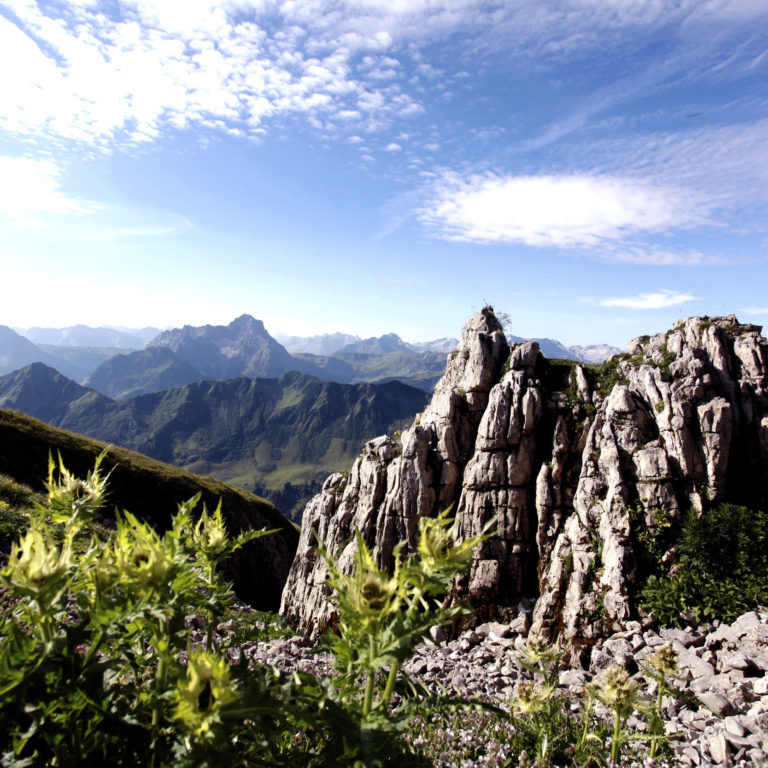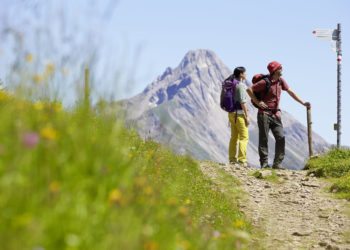
C Kleinwalsertal Gottesacker Widderstein (c) Kleinwaslertal Tourismus
In the labyrinth of stones
On a hike in Kleinwalsertal

C Kleinwalsertal Gottesacker Widderstein (c) Kleinwaslertal Tourismus
On a hike in Kleinwalsertal
Ernst Haller has been hiking all of his professional life, and almost all of his lifetime, preferably in the Kleinwalsertal, where he was born and bred. He told us his story – and much more – during a hike to the Gottesacker plateau.
TEXT: ANNE SCHÜSSLER
It is with a resolute, brisk stepthat Ernst Haller walks ahead. The path up the mountain is a sea of small, sharp bends. The path is narrow and stony, yet Ernst advances as if he knew every stick and every stone of it. His gaze wanders across the countryside and far down into the valley which, this morning, is still nestled under a thick blanket of clouds as if it were having a lie-in.
Ernst Haller, on the other hand, is full of beans. The 80-year-old is a mountain guide in the Kleinwalsertal, and today is accompanying us to the Gottesacker plateau. This unique karst landscape, which is under conservation, lies to the north of the Hoher Ifen and the best way to get there is by the Ifen cable car. Over the course of millions of years, the water has cut conspicuous grooves and clefts out of the limestone. The water also seeps through cracks deep into the limestone, cutting out numerous karst caves on the plateau. This is what shaped this unique rock formation which is home to many species of plant: alpine rose, mountain avens, black and red nigritella fragrant of vanilla, juniper, herb Paris, Michaelmas daisy, spring gentian, cotton grass and chives – all of them thrive here, under the Ifen. Nobody is really sure how the plateau got its name. According to one legend, a beggar on an alp asked its owners for some lard. However, underneath a thin layer of lard there was only muck in the container. As retribution, God punished the dairy farmer and his family for ridiculing the beggar – the alpine pasture was transformed into this rocky landscape.
As we climb higher and higher, the clouds come in thicker and thicker. We are surrounded by a white wall which seems to cut us off from the rest of the world, just like a massive wad of cotton wool. The only thing we can see is the landscape just ahead of us, and it is beautiful – green, lush meadows, and from the distance we can hear the ringing of the cow bells. Small drops of dew glitter on the flowers on the side of the path. “I particularly love these moments of tranquillity,” explains Ernst Haller. He has been hiking and climbing mountains all over the world for over 70 years. Once upon a time it was a necessity. Then it became a job. Now it is a passion. Even as a little boy he had to regularly hike up to his parents’ alp, look after the cattle and fetch cream.
These errands allowed me to live with and to experience nature, and I can still remember the hikes, like today in the mist. I loved it even back then.
The further we advance, the more fascinating the countryside becomes: huge cliffs tower above us, covered with mosses and meadow herbs. Rivulets and puddles of water now appear out of the ground. Black alpine salamanders crawl out of their hiding places. Cute they are, and don’t mind us taking a good look at them. “Yes, they are rare,” says Ernst, who appears to be rather amused at our enthusiasm – naturally, he has seen loads of them in his time.
And then the seasoned mountain guide suddenly turns off the path and takes us across country. Nimbly, the man climbs over the rocks, seemingly oblivious to screes and holes.
As I get older, I like to take advantage of hiking to chill out, and I take pleasure in nature. The monotony of the exercise frees me.
Then he stops on a ledge. We catch up with him and take a look at the landscape in front of us in amazement. We have reached the plateau.
A grey desert of rocks opens up in front of us. The rock is marked with deep fissures and cracks. In parts, it shines black from the rain. Small ferns grow upwards out of the grooves – otherwise, there is a distinct absence of plant life. The low-hanging clouds give the setting a mystic undertone. The only sounds are from the steady splashing and the dripping of the water.
Rapt, we sit on a wooden bench leaning against the wall of the hut
and enjoy the complete silence.
We slowly advance across the karst landscape, with Ernst Haller at the front. We would undoubtedly have got lost without him. Now and again we throw a stone into one of the cracks just to see how far down it goes. Upshot: we really don’t want to fall down any of them! And so we climb on carefully.
We are worn out by the time we reach the closed hut of the Hahnenköpfle cable car. Climbing over the rocks is tiring. It is with a sense of gravity that Ernst tells us, “You really shouldn’t embark on a tour like today’s without a mountain guide,” whilst we fortify ourselves with the sandwiches we have brought with us. “Also, you need to bring plenty to drink with you. There is nothing after the Ifen hut, and it takes hours to fully cross the plateau.”
Rapt, we sit on a wooden bench leaning against the wall of the hut and enjoy the complete silence. Ernst is smiling contentedly, and now we understand what it is that has been driving him up the mountains for 70 years. It is moments like these.

You can book a tour with Ernst Haller here: www.bergschule.at

Beautiful and interesting alpine hike, though not too difficult.
4.95 km
3.3 h
mittel



| Difficulty: | mittel |
|---|---|
| Distance: | 4.95 km |
| Ascent: | 350 m |
| Duration: | 3.3 h |
| Deepest point: | 1275 m |
| Highest point: | 1625 m |
| Condition: |
|
| Experience: |
|
| Landscape: |
|
Beautiful and interesting alpine hike, though not too difficult.
Start of tourHirschegg
End of tourHirschegg
DescriptionThe hike takes you into a geologically and botanically very interesting side valley. As far as Melköde, you hike on a slightly uphill path through the Rüchewald, then you go on the mountain path up to the Schwarzwasserhütte and back again. The Schwarzwassertal is an important refuge for endangered animal species such as capercaillie, black grouse and hazel deer, sparrowhawk, stone grouse, golden eagle, eagle owl, dipper, adder, etc. and…
Best season| JAN | FEB | MAR | APR | MAY | JUN |
| JUL | AUG | SEP | OCT | NOV | DEC |

Day tour for persistent hikers crossing a fascinating, though barren karst landscape.
14.44 km
6.5 h
schwer



| Difficulty: | schwer |
|---|---|
| Distance: | 14.44 km |
| Ascent: | 950 m |
| Descent: | 1161 m |
| Duration: | 6.5 h |
| Deepest point: | 1053 m |
| Highest point: | 2077 m |
| Condition: |
|
| Experience: |
|
| Landscape: |
|
Day tour for persistent hikers crossing a fascinating, though barren karst landscape.
Start of tourHirschegg
End of tourRiezlern
DescriptionThe tour takes you through the wild, rugged karst landscape of the Gottesacker plateau – for anyone interested in geological and botanical phenomenons an absolute must! Another highlight are the nearby steep walls of the Ifen plateau during the ascent through the Ifenmulde. Provide sufficient drinks and food for this long tour – there are no refreshment stops or catering facilities after the Ifenhütte.
Best season| JAN | FEB | MAR | APR | MAY | JUN |
| JUL | AUG | SEP | OCT | NOV | DEC |